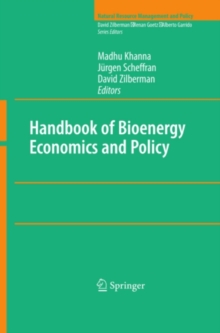
In Pursuit of an African Green Revolution : Views from Rice and Maize Farmers' Fields PDF
Edited by Keijiro Otsuka, Donald F. Larson
Part of the Natural Resource Management and Policy series
Description
This book explores recent experiences in the effort to bring about a Green Revolution in Sub-Saharan Africa (SSA). The chapters focus on rice and maize, which are promising and strategic smallholder crops. Significantly, we find that an African Rice Revolution has already begun in many irrigated areas, using Asian-type modern varieties, chemical fertilizer, and improved management practices. Further, we find that the same technological package significantly increases the productivity and profitability of rice farming in rainfed areas as well. We also find evidence that that management training, when done well, can boost productivity on smallholder farms. This suggests that African governments can accelerate the pace of Africa's Rice Revolution by strengthening extension capacity.
The story for maize is wholly different, where most farmers use local varieties, apply little chemical fertilizer, and obtain very low yields. However, in the highly populated highlands of Kenya, a number of farmers have adopted high-yielding hybrid maize varieties and chemical fertilizer, as was the case in the Asian Green Revolution, apply manure produced by stall-fed cows, as was the case during the British Agricultural Revolution, and keep improved cows or cross-breeds from European cows and local stock, as was the case of the Indian White Revolution. We conclude that while rice in Africa has benefited from an Asian Green Revolution strategy that emphasizes modern seeds, inputs, and focused knowledge transfers, the success of Africa's Maize Revolution will require a different system approach based on hybrid maize, chemical and organic fertilizers, and stall-fed cross-bred cows.
Information
-
Download - Immediately Available
- Format:PDF
- Publisher:Springer Japan
- Publication Date:24/11/2015
- Category:
- ISBN:9784431556930
Information
-
Download - Immediately Available
- Format:PDF
- Publisher:Springer Japan
- Publication Date:24/11/2015
- Category:
- ISBN:9784431556930









